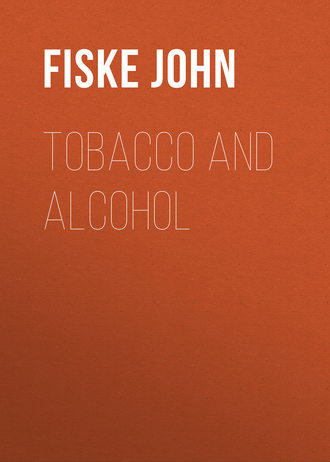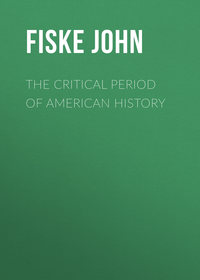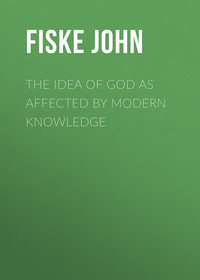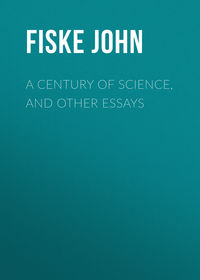 полная версия
полная версияTobacco and Alcohol

John Fiske
Tobacco and Alcohol / I. It Does Pay to Smoke. II. The Coming Man Will Drink Wine
– "Quæres a me lector amabilis quod plerique sciscitantur laudemne an vero damnem tabaci usum? Respondeo tabacum optimum esse. Tu mi lector tabaco utere non abutere." – Magnenus Exercitationes de Tabaco, Ticino, 1658.
PREFACE
Five weeks ago to-day the idea of writing an essay upon the physiological effects of Tobacco and Alcohol had never occurred to us. Nevertheless, the study of physiology and pathology – especially as relating to the action of narcotic-stimulants upon nutrition – has for several years afforded us, from time to time, agreeable recreation. And being called upon, in the discharge of a regularly-recurring duty, to review Mr. Parton's book entitled "Smoking and Drinking," it seemed worth while, in justice to the subject, to go on writing, – until the present volume was the result.
This essay is therefore to be regarded as a review article, rewritten and separately published. It is nothing more, as regards either the time and thought directly bestowed upon it, or the completeness with which it treats the subject. Bearing this in mind, the reader will understand the somewhat fantastic sub-titles of the book, and the presence of a number of citations and comments which would ordinarily be neither essential nor desirable in a serious discussion. Had we been writing a systematic treatise, with the object of stating exhaustively our theory of the action of Tobacco and Alcohol, we should have found it needful to be far more abstruse and technical; and we should certainly have had no occasion whatever to mention Mr. Parton's name. As it is, the ideal requirements of a complete statement have been subordinated – though by no means sacrificed – to the obvious desideratum of making a summary at once generally intelligible and briefly conclusive.
The materials used especially in the preparation of this volume were the following:
Anstie: Stimulants and Narcotics. Philadelphia, 1865.
Lallemand, Duroy, et Perrin: Du Rôle de l'Alcool et des Anesthésiques. Paris, 1860.
Baudot: De la Destruction de l'Alcool dans l'Organisme. Union Médicale, Nov. et Déc., 1863.
Bouchardat et Sandras: De la Digestion des Boissons Alcooliques. Annales de Chimie et de Physique, 1847, tom. XXI.
Duchek: Ueber das Verhalten des Alkohols im thierischen Organismus. Vierteljahrschrift für die praktische Heilkunde. Prague, 1833.
Von Bibra: Die Narkotischen Genussmittel und der Mensch. Nürnberg, 1855.
And the works of Taylor, Orfila, Christison, and Pereira, on Materia Medica and Poisons; of Flint, Dalton, Dunglison, Draper, Carpenter, Liebig, Lehmann, and Moleschott, on general Physiology; several of the special works on Tobacco mentioned in the Appendix; and the current medical journals.
Oxford Street, Cambridge, November 23, 1868.
I.
It does Pay to Smoke
Mr. James Parton having abandoned the habit of smoking, has lately entered upon the task of persuading the rest of mankind to abandon it also.1 His "victory over himself" – to use the favourite expression – would be incomplete unless followed up by a victory over others; and he therefore desists for a season from his congenial labours in panegyrizing Aaron Burr, B. +F. Butler, and other popular heroes, in order that he may briefly descant upon the evil characters of tobacco and its kindred stimulants. Some of the sophisms and exaggerations which he has brought into play while doing so, invite attention before we attempt what he did not attempt at all – to state squarely and honestly the latest conclusions of science on the subject.
According to Mr. Parton, tobacco is responsible for nearly all the ills which in modern times have afflicted humanity. As will be seen, he makes no half-way work of the matter. He must have the whole loaf, or he will not touch a crumb. He scorns all carefully-limited, compromising, philosophical statements of the case. Whatever the verdict of science may turn out to be, he knows that no good ever did come, ever does come, or ever will come, from the use of tobacco. All bad things which tobacco can do, as well as all bad things which it cannot do – all probable, possible, improbable, impossible, inconceivable, and nonsensical evil results – are by Mr. Parton indiscriminately lumped together and laid at its door. It is simply a diabolical poison which, since he has happily eschewed the use of it, had better be at once extirpated from the face of the earth. Of all this, Mr. Parton is so very sure that he evidently thinks any reasoning on the subject quite superfluous and out of place.
The paucity of his arguments is, however, compensated by the multitude and hardihood of his assertions. A sailor, he says, should not smoke; for "why should he go round this beautiful world drugged?" Note the petitio principii in the use of the word "drugged." That the smoker is, in the bad sense of the word, drugging himself, is the very point to be determined; but Mr. Parton feels so sure that he substitutes a sly question-begging participle for a conscientious course of investigation. With nine readers out of ten this takes just as well; and then it is so much easier and safer, you know. Neither should soldiers smoke, for the glare of their pipes may enable some hostile picket to take deadly aim at them. Moreover, a "forward car," in which a crowd of smoking veterans are returning from the seat of war, is a disgusting place. And "that two and two make four is not a truth more unquestionably certain than that smoking does diminish a soldier's power of endurance, and does make him more susceptible to imaginary dangers." (p. 17.) This statement, by the way, is an excellent specimen of Mr. Parton's favourite style of assertion. He does not say that his private opinion on this complex question in nervous physiology is well supported by observation, experiment and deduction. He does not say that there is at least a preponderance of evidence in its favour. He does not call it as probable as any opinion on such an intricate matter can ever be. But he says "it is as unquestionably certain as that two and two make four." Nothing less will satisfy him. Let it no longer be said that, in the difficult science of physiology, absolute certainty is not attainable!
Then again, the soldier should not smoke, because he ought always to be in training; and no Harvard oarsman needs to be told "that smoking reduces the tone of the system and diminishes all the forces of the body – he knows it." The profound physiological knowledge of the average Harvard under-graduate it would perhaps seem ungracious to question; but upon this point, be it said with due reverence, doctors disagree. We have known athletes who told a different story. Waiving argument for the present, however, we go on presenting Mr. Parton's "certainties." One of these is that every man should be kept all his life in what prizefighters call "condition," which term Mr. Parton supposes to mean "the natural state of the body, uncontaminated by poison, and unimpaired by indolence or excess." Awhile ago we had "drugs," now we have "poison," but not a syllable of argument to show that either term is properly applicable to tobacco. But Mr. Parton's romantic idea of the state of the body which accompanies training is one which is likely to amuse, if it does not edify, the physiologist. So far from "condition" being the "natural (i.e. healthy) state of the body," it is an extremely unnatural state. It is a condition which generally exhausts a man by the time he is thirty-five years old, rendering him what prizefighters call "stale." It is not "natural," or normal, for the powers either of the muscular or of the nervous system to be kept constantly at the maximum. What our minds and bodies need is intermittent, rhythmical activity. "In books and work and healthful play," not "in work and work and work alway," should our earlier and later years be passed; and a man who is always training for a boatrace is no more likely to hold out in the plenitude of his powers than a man who is always studying sixteen hours a day. The only reason why our boys at Yale and Harvard are sometimes permanently benefited by their extravagant athleticism is that they usually leave off before it is too late, and begin to live more normally. For the blood to be continually determined toward the muscles, and for the stomach to be continually digesting none but concentrated food, is a state of things by no means favourable to a normal rate and distribution of nutritive action; and it is upon this normal rate and distribution of nutrition that life, health and strength depend. It is as assisting this process that we shall presently show the temperate use of tobacco to be beneficial. Mr. Parton's idea well illustrates the spirit of that species of "radical" philosophy which holds its own opinions as absolutely and universally, not as relatively and partially, true; which, consequently, is incapable of seeing that one man's meat may be another man's poison, and which is unable to steer safely by Scylla without turning the helm so far as to pitch head foremost into Charybdis. Mr. Parton sees that athletic exercise is healthful, and he jumps at once to the conclusion that every man should always and in all circumstances keep himself in training. Such was not the theory of the ancient Athenians: μηδεν ἂγαν was their principle of life, – the principle by virtue of which they made themselves competent to instruct mankind.
Having thus said his say about muscular men, Mr. Parton goes on to declare that smoking is a barbarism. "There is something in the practice that allies a man with barbarians, and constantly tends to make him think and talk like a barbarian." We suppose Mr. Parton must know this; for he does not attempt to prove it, unless indeed he considers a rather stupid anecdote to be proof. He tells us how he listened for an hour or so to half a dozen Yale students in one of the public rooms of a New-Haven hotel, talking with a stable-keeper about boat-racing. They swore horribly; and of course Mr. Parton believes that if they had not been smokers they would neither have used profane language nor have condescended to talk with stable-keepers. Sancta simplicitas!
"We must admit, too, I think, that smoking dulls a man's sense of the rights of others. Horace Greeley is accustomed to sum up his opinions upon this branch of the subject by saying: 'When a man begins to smoke, he immediately becomes a hog.'" Our keen enjoyment of Mr. Greeley's lightness of touch and refined delicacy of expression should not be allowed to blind us to the possible incompleteness of his generalization. What! Milton a hog? Locke, Addison, Scott, Thackeray, Robert Hall, Christopher North – hogs?
And then smoking is an expensive habit. If a man smoke ten cigars daily, at twenty cents each, his smoking will cost him from seven to eight hundred dollars a year. This dark view of the case needs to be enlivened by a little contrast. "While at Cambridge the other day, looking about among the ancient barracks in which the students live, I had the curiosity to ask concerning the salaries of the professors in Harvard College." Probably he inquired of a Goody, or of one of the Pocos who are to be found earning bread by the sweat of their brows in the neighbourhood of these venerable shanties, for it seems they told him that the professors were paid fifteen or eighteen hundred dollars a year. Had he taken the trouble to step into the steward's office, he might have learned that they are paid three thousand dollars a year. Such is the truly artistic way in which Mr. Parton makes contrasts – $1500 per annum for a professor, $800 for cigars! Therefore, it does not pay to smoke.
Smoking, moreover, makes men slaves. The Turks and Persians are great smokers, and they live under a despotic form of government. Q.E.D. The extreme liberality of Oriental institutions before the introduction of tobacco Mr. Parton probably thinks so well known as not to require mention. But still worse, the Turks and Persians are great despisers of women; and this is evidently because they smoke. For woman and tobacco are natural enemies. The most perfect of men, the "highly-groomed" Goethe – as Mr. Parton elegantly calls him – loved women and hated tobacco. This aspect of the question is really a serious one. Tobacco, says our reformer, is woman's rival, – and her successful rival; therefore she hates it. For as Mr. Parton, with profound insight into the mysteries of the feminine character, gravely observes, "women do not disapprove their rivals; they hate them." This "ridiculous brown leaf," then, is not only in general the cause of all evil, but in particular it is the foe of woman. "It takes off the edge of virility"!!2 It makes us regard woman from the Black Crook point of view. If it had not been for tobacco, that wretched phantasmagoria would not have had a run of a dozen nights. "Science" justifies this conjecture, and even if it did not, Mr. Parton intimates that he should make it. Doubtless!
One bit of Mr. Parton's philosophy still calls for brief comment. He wishes to speak of the general tendency of the poor man's pipe; and he means to say "that it tends to make him satisfied with a lot which it is his chief and immediate duty to alleviate, – he ought to hate and loathe his tenement-house home." A fine specimen of the dyspeptic philosophy of radicalism! Despise all you have got, because you cannot have something better. We believe it is sometimes described as the philosophy of progress. There can of course be no doubt that Mr. Parton's hod-carrier will work all the better next day, if he only spends the night in fretting and getting peevish over his "tenement-house home."
Such then, in sum and substance, is our reformer's indictment against tobacco. It lowers the tone of our systems, and it makes us contented; it wastes money, it allies us with barbarians, and it transforms us —mira quadam metamorphosi– into swine. Goethe, therefore, did not smoke, the Coming Man will not smoke, and General Grant, with tardy repentance, "has reduced his daily allowance of cigars." And as for Mr. Buckle, the author of an able book which Mr. Parton rather too enthusiastically calls "the most valuable work of this century," – if Mr. Buckle had but lived, he would doubtless have inserted a chapter in his "History," in which tobacco would have been ranked with theology, as one of the obstacles to civilization.
Throughout Mr. Parton's rhapsody, the main question, the question chiefly interesting to every one who smokes or wishes to smoke, is uniformly slurred over. Upon the question whether it is unhealthy to smoke, the Encyclopædias which Mr. Parton has consulted do not appear to have helped him to an answer. Yet this is a point which, in making up our minds about the profitableness of smoking, must not be taken for granted, but scientifically tested.
What, then, does physiology say about this notion – rather widespread in countries over which Puritanism has passed – that the use of tobacco is necessarily or usually injurious to health? Simply that it is a popular delusion – a delusion which even a moderate acquaintance with the first principles of modern physiology cannot fail to dissipate. Nay, more; if our interpretation shall prove to be correct, it goes still further. It says that smoking, so far from being detrimental to health, is, in the great majority of cases, where excess is avoided, beneficial to health; in short, that the careful and temperate smoker is, other things equal, likely to be more vigorous, more cheerful, and more capable of prolonged effort than the man who never smokes.
We do not pretend to know all this, nor are we "as certain of it as that two and two make four." Such certainty, though desirable, is not to be had in complex physiological questions. But we set down these propositions as being, so far as we can make out, in the present state of science, the verdict of physiology in the matter. Future inquiry may reverse that verdict; but as the physiologic evidence now stands, there is a quite appreciable preponderance in favor of the practice of smoking. Such was our own conclusion long before we had ever known, or cared to know, the taste of a cigar or pipe; and such it remains after eight years' experience in smoking. We shall endeavor concisely to present the rationale of the matter, dealing with some general doctrines likely to assist us both now and later, when we come to speak of alcohol.
We do not suppose it necessary to overhaul and quote all that the illustrious Pereira, in his "Materia Medica,"3 and Messrs. Johnston and Lewes, in their deservedly popular books, have said about the physiologic action of tobacco. Their works may easily be consulted by any one who is interested in the subject; and their verdict is in the main confined to the general proposition that, from the temperate use of tobacco in smoking, no deleterious results have ever been proved to follow. More modern and far more elaborate data for forming an opinion are to be found in the great treatise of Dr. Anstie, on "Stimulants and Narcotics," which we shall make the basis of the following argument.4
In the first place, we want some precise definition of the quite vaguely understood word, "narcotic." What is a narcotic? A narcotic is any poison which, when taken in sufficient quantities into the system, produces death by paralysis. The tyro in physiology knows that death must start either from the lungs, the heart, or the nervous system. Now a narcotic is anything which, in due quantity, kills by killing the nervous system. When death is caused by too great a proportion of carbonic acid in the air, it begins at the lungs; but when it is caused by a dose of prussic acid, it begins at the medulla oblongata, the death of which causes the heart and lungs to stop acting. Prussic acid is, therefore, a narcotic; and so are strychnine, belladonna, aconite, nicotine, sulphuric ether, chloroform, alcohol, opium, thorn-apple, betel, hop, lettuce, tea, coffee, coca, hemp, chocolate, and many other substances. All these, taken in requisite doses, will kill by paralysis; and all of them, taken in lesser but considerable doses, will induce a state of the nerves known as narcosis, which is nothing more nor less than incipient paralysis. Every man who smokes tobacco, or drinks tea or coffee, until his hands are tremulous and his stomach-nerves slightly depressed, has just started on the road to paralysis: he may never travel farther on it, but he has at least turned the corner. Every man who drinks ale, wine, or spirit until his face is flushed and his forehead moist, has slightly paralyzed himself. Alcoholic drunkenness is paralysis. The mental and emotional excitement, falsely called exaltation, is due, not to stimulation, but to paralysis of the cerebrum. The unsteady gait and groping motion of the hands are due to paralysis of the cerebellum. The feverish pulse and irregular respiration are due to paralysis of the medulla oblongata. The flushed face and tremulous, distressed stomach, are due to paralysis of the sympathetic ganglia. And when a person is "dead-drunk," his inability to perform the ordinary reflex acts of locomotion and grasping is due in part to paralysis of the spinal centres. The coma, or so-called sleep of drunkenness, is perfectly distinct from true reparative sleep, being the result of serious paralysis of the cerebrum, and closely allied to delirium.5 Now, what we have stated in detail concerning alcohol is also true of tobacco. A fatal dose of nicotine kills, just like prussic acid, by paralyzing the medulla, and thus stopping the heart's beating. The ordinary narcotic dose does not produce such notable effects as the dose of alcohol, because it is hardly possible to take enough of it. Excessive smoking does not make a man maudlin, but it causes restless wakefulness, which is a symptom of cerebral paralysis, and is liable, in rare cases, to end in coma. Its action on the cerebellum and spinal cord cannot be readily stated; but its effect on the medulla and sympathetic is most notable, being seen in depression or feeble acceleration of the pulse, trembling, nausea of the stomach, and torpidity of the liver and intestines. Nearly or quite all of these effects producible by tobacco, are producible also, in even a heightened degree, by narcotic doses of tea and coffee. A concentrated dose of tea will produce a paralytic shock; and a single cup of very strong coffee is sometimes enough to cause alarming disorder in the heart's action. All these narcotic effects, we repeat, are instances of paralytic depression. In no case are they instances of stimulus followed by reaction; but whenever a narcotic dose is taken, the depressive paralytic action begins as soon as the dose is absorbed by the blood-vessels. The cheerful and maudlin drunkard is not under the action of stimulus. His rapid, irregular, excited mental action is no more entitled to be called "exaltation" than is the delirium of typhoid fever. In the one case and in the other, we have not stimulation but depression of the vitality of the cerebrum; in both cases, the nutrition is seriously impaired; in both cases, molecular disorganization of the nerve-material is predominant.
So much concerning narcotics has been established, with vast and profound learning, by Dr. Anstie. No doubt, by this time, the reader is beginning to rub his eyes and ask, Is this the way in which you are going to show that smoking is beneficial? You define tobacco as a poison which causes paralysis, and then assure us that it pays to smoke! It is true, this has at first sight a paradoxical look; but as the reader proceeds further, he will see that we are not indulging either in paradoxes or in sophisms. We wish him to take nothing for granted, but merely to follow attentively our exposition of the case. We have indeed called tobacco a poison, – and so it is, if taken in narcotic doses. We have accused it of producing paralysis, – and so it does, when taken in adequate narcotic doses. We would now call attention to a property of narcotics, which is well enough known to all physiologists, but is usually quite misapprehended or ignored by popular writers on alcohol and tobacco.6 We allude to the fact that narcotics, when taken in certain small quantities, do not behave as narcotics, but as stimulants; and that they will in such cases produce the exact reverse of a narcotic effect. Instead of lowering nutrition, they will raise it; instead of paralyzing, they will invigorate. Taken in a stimulant dose, tobacco is not only not a producer, it is an averter, of paralysis. It is not only not a poison, but it is a healthful, reparatory stimulus.
It is desirable that this point should be thoroughly understood before we advance a step farther. Here is the pons asinorum in the study of narcotics, but it must be crossed if we would get at the truth concerning alcohol and tobacco. Alcohol is a poison, says the teetotaler, who means well, but has not studied the human organism; alcohol is a poison, and once a poison always a poison. Nothing can seem more logical or reasonable, so long as one knows nothing about the subject. A quart of brandy is admitted to be poison; is not, therefore, a spoonful of brandy also poison? We reply, by no means. Physiological questions are not to be settled by formal logic. Here the quantity is the all-essential element to be taken into the account. Common salt, in large doses, is a virulent poison; in lesser doses it is a powerful emetic; in small doses it is a gentle stimulant, and an article of food absolutely essential to the maintenance of life. In the spirit of the teetotaler's logic, then, it may be asked, If a pound of salt is a poison, is not a grain of salt also a poison? We reply, call it what you please, you cannot support life without it. So from the poisonous character of the quart of brandy, the poisonous character of the spoonful is by no means a legitimate inference. The evil effects of the small dose are to be ascertained by experiment, not to be taken for granted. Logic is useful in the hands of those who understand the subject they reason about; but in other hands it sometimes leads to queer results. It was logic that used up the one-hoss shay.
The general principle to guide us here is that of Claude Bernard, that whatever substance or action, in due amount, tends to improve nutrition, may, in excessive amount, tend to damage nutrition. In the vast majority of cases the difference between food and poison, between beneficent and malignant action, is only a difference of quantity. Oxygen is the all-important stimulus, without which nutrition could not be carried on for a moment. It constitutes about one-fifth of our atmospheric air. Let us now step into an atmosphere of pure oxygen, and we shall speedily rue such a radical proceeding. We shall live so fast that waste will soon get ahead of repair, and our strength will be utterly exhausted. The effect of sunlight on the optic nerve is to stimulate the medulla, and increase thereby the vigor of the circulation. But too intense a glare produces blindness and dizziness. The carpenter's thumb, by friction against the tools he uses, becomes over-nourished and tough; but if the friction be too continuous, there is lowered nutrition and inflammation. Moderate exercise enlarges the muscles; exercise carried beyond the point of fatigue wastes them. The stale prize-fighter and the overworked farmer are, from a physical point of view, pitiable specimens of manhood. A due amount of rich food strengthens the system and renders it superior to disease; an excessive amount of rich food weakens the system, and opens the door for all manner of aches and ailments. A pinch of mustard, eaten with meat, stimulates the lining of the stomach, and probably aids digestion; but a mustard poultice lowers the vitality of any part to which it is applied. Moderate emotional excitement is a healthful stimulus, both to mind and body; but intense and prolonged excitement is liable to produce delirium, mania, or paralysis. Ne quid nimis, therefore, the maxim of the wise epicurean, is also the golden rule of hygiene. If you would keep a sound mind in a sound body, do not rush to extremes. Steer cautiously between Scylla and Charybdis, and do not get wrecked upon the one or swallowed up in the other.









